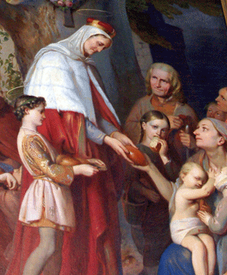
He ruled his kingdom by his virtues rather than by force. To the orphaned, the widowed, and the destitute he was very charitable, so that some whiles in the winter he carried firewood to the needy on his own shoulders. He helped oftentimes to bury the poor, he set captives free, and went many times to the prisons at the dead of night to comfort with money and advice them that were detained therein. To a Prince of so tender an heart it was a great grief to be behoven to condemn any to death, however guilty. For Priests he had a most earnest respect, and with his own hands sowed the corn and pressed the grapes for the bread and wine which they were to use for the Sacrifice. He would walk around the Church at night with bare feet upon the snow and ice, leaving behind him bloody footprints that warmed the ground.
For his Bodyguard he had angels. For when Radislas, Prince of Gurinna, invaded Bohemia, and Wenceslas, to save the effusion of his people's blood, went out to meet him in single combat, two angels were seen serving him with arms, and heard to say to the adversary: Strike not. Therefore, his enemy was stricken with terror, fell down in reverence before him, and begged his forgiveness. When he went to Germany, the Emperor saw two angels carrying a golden Cross before him as he drew night him, and arose from his throne, embraced him in his arms, created him a King, and gifted him with the arm of the holy Martyr Vitus. Nevertheless, his godless brother, at the exhortation of their mother, bade him to a feast, and when Wenceslas, with a foreboding of the death prepared for him, went afterwards into the Church, and was praying there, Boleslas followed him thither, together with some accomplices of his crime, and when they had wounded him, despatched him with a lance. The stains of his blood may still be seen upon the walls. By the judgment of God, his unnatural mother was swallowed up by the earth, and his murderers, in divers ways, perished miserably.




